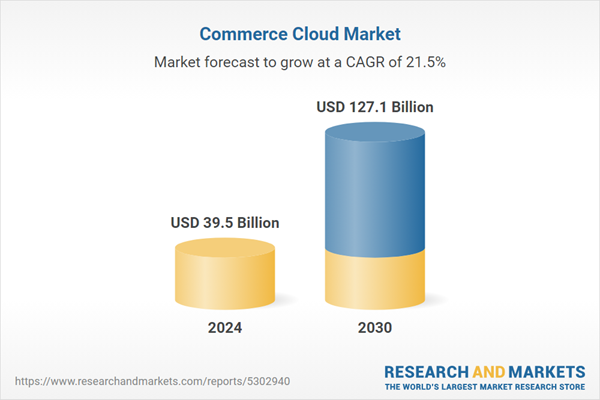Global Commerce Cloud Market - Key Trends & Drivers Summarized
Why Is Commerce Cloud Transforming the Retail and E-Commerce Landscape?
Commerce Cloud is revolutionizing the retail and e-commerce industry by providing a flexible, scalable platform that supports personalized shopping experiences, omnichannel integration, and seamless digital transformation. Commerce Cloud solutions enable retailers and brands to unify their sales channels, including web, mobile, in-store, and social media, allowing for a cohesive customer experience that aligns with the expectations of today's consumers. With Commerce Cloud, businesses can leverage data analytics, artificial intelligence (AI), and machine learning (ML) to personalize product recommendations, automate customer service, and optimize inventory management. The platform also allows companies to quickly launch and manage online stores with minimal IT infrastructure, enabling faster time-to-market and greater agility. For retailers navigating the complexities of a digital-first world, Commerce Cloud has become an essential solution, supporting them in adapting to rapid changes in consumer behavior and staying competitive in a crowded market. The adoption of Commerce Cloud has accelerated due to the demand for seamless omnichannel experiences, where customers expect to shop across devices and channels without friction. Whether browsing on mobile, purchasing online, or picking up in-store, Commerce Cloud provides retailers with the tools to integrate these touchpoints, improving customer satisfaction and driving loyalty. As consumer expectations for convenience and personalization continue to rise, Commerce Cloud solutions empower retailers to meet these demands with tailored, data-driven experiences that enhance the customer journey from discovery to checkout. In an increasingly digital retail landscape, Commerce Cloud offers a powerful solution for companies striving to deliver engaging, adaptive shopping experiences.How Are Technological Advancements Enhancing Commerce Cloud Capabilities?
Technological advancements, particularly in AI, ML, and predictive analytics, are enhancing the capabilities of Commerce Cloud, enabling businesses to offer highly personalized and efficient shopping experiences. AI-driven insights allow Commerce Cloud platforms to analyze customer behavior, predict purchase intent, and personalize product recommendations in real-time, increasing the likelihood of conversion. Machine learning algorithms can analyze large volumes of customer data to forecast demand and optimize inventory, helping retailers avoid stockouts or overstock situations and reducing operational costs. Additionally, AI-powered chatbots and virtual assistants have become popular features in Commerce Cloud platforms, offering 24/7 customer support and enhancing the shopping experience with instant responses and personalized assistance. The integration of Commerce Cloud with IoT devices and augmented reality (AR) is also transforming how customers interact with products. IoT-enabled devices in physical stores can collect customer data to improve in-store experiences, while AR functionalities allow online shoppers to visualize products, such as furniture or clothing, in their own spaces. Additionally, Commerce Cloud platforms leverage API-first architectures, enabling seamless integration with third-party applications, payment gateways, and CRM systems, which allows businesses to customize their solutions without compromising scalability or performance. These technological advancements are enhancing the flexibility and power of Commerce Cloud solutions, providing retailers with robust tools to improve customer engagement, streamline operations, and drive revenue.Which Industries Are Driving Demand for Commerce Cloud Beyond Retail?
While retail remains the primary adopter of Commerce Cloud, other industries, including consumer goods, manufacturing, automotive, and healthcare, are also embracing this technology to enhance customer engagement and streamline digital transactions. In the consumer goods industry, Commerce Cloud enables brands to manage direct-to-consumer (DTC) sales channels, allowing them to interact directly with customers and gather valuable data on purchasing behavior. For manufacturers, Commerce Cloud offers a streamlined solution to manage complex B2B transactions, allowing clients to order parts or products online, track orders, and receive support seamlessly. This shift not only improves the customer experience but also enables manufacturers to reduce distribution costs and gain deeper insights into customer preferences.The automotive sector is also adopting Commerce Cloud to support digital retail, as consumers increasingly seek online resources to browse, configure, and even purchase vehicles. This technology allows automotive companies to provide personalized recommendations based on customer data, such as vehicle preferences and budget, enhancing the online car-buying experience. In healthcare, Commerce Cloud supports the digital sales of medical devices and products, allowing customers to access information, place orders, and track shipments with ease. This cross-industry adoption illustrates Commerce Cloud's versatility and the growing trend of digitalization across sectors, as businesses seek to improve customer engagement and optimize sales channels in response to shifting consumer expectations.
What's Driving Growth in the Commerce Cloud Market?
The growth in the Commerce Cloud market is driven by several factors, including the rise of digital-first consumer behavior, advancements in AI and machine learning, and the need for omnichannel integration. As consumers increasingly prioritize online shopping and expect seamless experiences across devices and platforms, Commerce Cloud provides businesses with the tools to meet these demands through unified, data-driven shopping experiences. Technological advancements, particularly in AI, have further propelled the market by enabling personalized recommendations, demand forecasting, and intelligent customer service, which improve conversion rates and enhance customer loyalty. The growing importance of omnichannel commerce has also supported the market, as retailers strive to create cohesive brand experiences across online and offline touchpoints, such as buy-online-pickup-in-store (BOPIS) options and curbside pickup. Moreover, the global shift toward direct-to-consumer (DTC) business models has led many brands to adopt Commerce Cloud solutions to engage customers directly, gather actionable insights, and personalize interactions. The rise of subscription-based and recurring revenue models in e-commerce has also driven demand for Commerce Cloud, as companies look for flexible solutions that accommodate diverse business needs and support long-term customer relationships. Together, these drivers underscore a strong growth outlook for the Commerce Cloud market as businesses prioritize agility, scalability, and customer-centricity in an evolving digital commerce landscape.Report Scope
The report analyzes the Commerce Cloud market, presented in terms of market value (US$ Thousand). The analysis covers the key segments and geographic regions outlined below.- Segments: Component (Platform, Services); Application (Grocery & Pharmaceutical, Travel & Hospitality, Electronics, Furniture & Bookstores, Fashion & Apparel, Other Applications).
- Geographic Regions/Countries:World; United States; Canada; Japan; China; Europe (France; Germany; Italy; United Kingdom; and Rest of Europe); Asia-Pacific; Rest of World.
Key Insights:
- Market Growth: Understand the significant growth trajectory of the Commerce Cloud Platform segment, which is expected to reach US$71.2 Billion by 2030 with a CAGR of a 20.3%. The Commerce Cloud Services segment is also set to grow at 23% CAGR over the analysis period.
- Regional Analysis: Gain insights into the U.S. market, valued at $11.5 Billion in 2024, and China, forecasted to grow at an impressive 20.9% CAGR to reach $19.6 Billion by 2030. Discover growth trends in other key regions, including Japan, Canada, Germany, and the Asia-Pacific.
Why You Should Buy This Report:
- Detailed Market Analysis: Access a thorough analysis of the Global Commerce Cloud Market, covering all major geographic regions and market segments.
- Competitive Insights: Get an overview of the competitive landscape, including the market presence of major players across different geographies.
- Future Trends and Drivers: Understand the key trends and drivers shaping the future of the Global Commerce Cloud Market.
- Actionable Insights: Benefit from actionable insights that can help you identify new revenue opportunities and make strategic business decisions.
Key Questions Answered:
- How is the Global Commerce Cloud Market expected to evolve by 2030?
- What are the main drivers and restraints affecting the market?
- Which market segments will grow the most over the forecast period?
- How will market shares for different regions and segments change by 2030?
- Who are the leading players in the market, and what are their prospects?
Report Features:
- Comprehensive Market Data: Independent analysis of annual sales and market forecasts in US$ Million from 2024 to 2030.
- In-Depth Regional Analysis: Detailed insights into key markets, including the U.S., China, Japan, Canada, Europe, Asia-Pacific, Latin America, Middle East, and Africa.
- Company Profiles: Coverage of players such as Apttus, BigCommerce, Commercetools, Digital River, Elastic Path and more.
- Complimentary Updates: Receive free report updates for one year to keep you informed of the latest market developments.
Some of the 29 companies featured in this Commerce Cloud market report include:
- Apttus
- BigCommerce
- Commercetools
- Digital River
- Elastic Path
- Episerver
- IBM
- Kibo
- Magento
- Oracle
- Salesforce
- SAP
- Shopify
- Sitecore
- VTEX
This edition integrates the latest global trade and economic shifts into comprehensive market analysis. Key updates include:
- Tariff and Trade Impact: Insights into global tariff negotiations across 180+ countries, with analysis of supply chain turbulence, sourcing disruptions, and geographic realignment. Special focus on 2025 as a pivotal year for trade tensions, including updated perspectives on the Trump-era tariffs.
- Adjusted Forecasts and Analytics: Revised global and regional market forecasts through 2030, incorporating tariff effects, economic uncertainty, and structural changes in globalization. Includes historical analysis from 2015 to 2023.
- Strategic Market Dynamics: Evaluation of revised market prospects, regional outlooks, and key economic indicators such as population and urbanization trends.
- Innovation & Technology Trends: Latest developments in product and process innovation, emerging technologies, and key industry drivers shaping the competitive landscape.
- Competitive Intelligence: Updated global market share estimates for 2025, competitive positioning of major players (Strong/Active/Niche/Trivial), and refined focus on leading global brands and core players.
- Expert Insight & Commentary: Strategic analysis from economists, trade experts, and domain specialists to contextualize market shifts and identify emerging opportunities.
Table of Contents
Companies Mentioned (Partial List)
A selection of companies mentioned in this report includes, but is not limited to:
- Apttus
- BigCommerce
- Commercetools
- Digital River
- Elastic Path
- Episerver
- IBM
- Kibo
- Magento
- Oracle
- Salesforce
- SAP
- Shopify
- Sitecore
- VTEX
Table Information
| Report Attribute | Details |
|---|---|
| No. of Pages | 167 |
| Published | January 2026 |
| Forecast Period | 2024 - 2030 |
| Estimated Market Value ( USD | $ 39.5 Billion |
| Forecasted Market Value ( USD | $ 127.1 Billion |
| Compound Annual Growth Rate | 21.5% |
| Regions Covered | Global |









